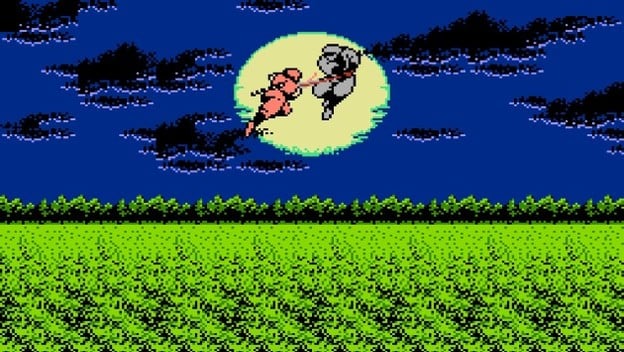For many, video games are a form of escapism. Our lives may suck, so we play something engaging for the next several hours before bedtime. In the past, I always associated escapism with RPGs (or at least science fiction and fantasy settings). However, I recently read a post on The AV Club about escapism, and I was pleased with the diverse choices.
It’s no coincidence that an abundance of these posts have appeared post-election, and don’t worry – I’m not here to insert my politics into games. I just thought it would be a neat idea to discuss the kind of game I like to play whenever I’m feeling at my lowest – simple yet difficult games – and offer some suggestions to you in case you’re in a similar situation. Please feel free to leave your own suggestions in the comments.
At my lowest point, I borrowed my brother’s Wii and turned to Ninja Gaiden (NES) because I was going through a retro phase, and many writers have included it on their hardest games lists. Although I had a lot of fun controlling Ryu’s swift, acrobatic movements, I constantly yelled in rage due to the brutal difficulty. With just a slight scroll of the screen, an enemy can respawn like magic. This design choice contributed to most of my frustration, and made act 6-2 the hardest level in the game. I replayed this level so many times that if I were to play Ninja Gaiden today, I would possibly be able to beat this level through sheer muscle memory. If I lost to the final boss, meaning I never learned his attack pattern. It was very tempting for me to call the game out for being unfair, even though it was likely my own fault in retrospect.
Although I was constantly angry at the game, I was equally inspired by it. I ended up creating a plan to compensate for my lack of knowledge about the final boss’s capricious attack patterns. Basically, I learned where all the fireballs were located, and then spammed them on the final boss’s second form. Then, I died, collected the fireballs all over again, and then used them on the final form. Admittedly, my strategy could have been more efficient, but it worked, and the satisfaction I felt afterwards inspired me to go and do something productive. Did beating Ninja Gaiden make all my problems go away? No, but I certainly felt like I could tackle life one day at a time, much like act 6-2.

Now, I’m in another rut, and I’ve lost confidence in my abilities – again, not necessarily about the election. Once again, I’ve decided to escape into video games for a while and eventually return with what I need. I’m without a Wii or NES this time, so my game of choice is Thumper – a rhythm violence game (developers’ words, not mine) that’s simple to play yet difficult to master. It’s not nearly as difficult as Ninja Gaiden because you resume where you left off, making the game perfect for short bursts. If I’m stuck, I walk away from the game or take a nap, and by the time I return I feel as though my mind has melded with the trippy level design. This is elucidated by how the clacking of the DualShock 4 controller and the industrial soundtrack are synchronized. It’s not long before I fail again, but that’s ok because I can take what small victories I can, and then apply them elsewhere in my daily life (by the way, I recommend Thumper ).
I think players, whether they’re aware of it or not, don’t just escape into video games. There’s something in their lives that needs to be fulfilled, and maybe video games can help them with that. I imagine people might turn to sprawling RPGs because they’re looking for a world in which they feel more accepted. I know a friend who plays World of Warcraft because he misses being on a team like in his high school football days. There’s no wrong answer for which game you play to escape, but I encourage you to learn from your trip and return feeling refreshed. That said, I also encourage you to take the time to time to play something akin to NES-hard. Beating a difficult game might be considered a waste of time, but developing perseverance is a skill that can last you a lifetime.
